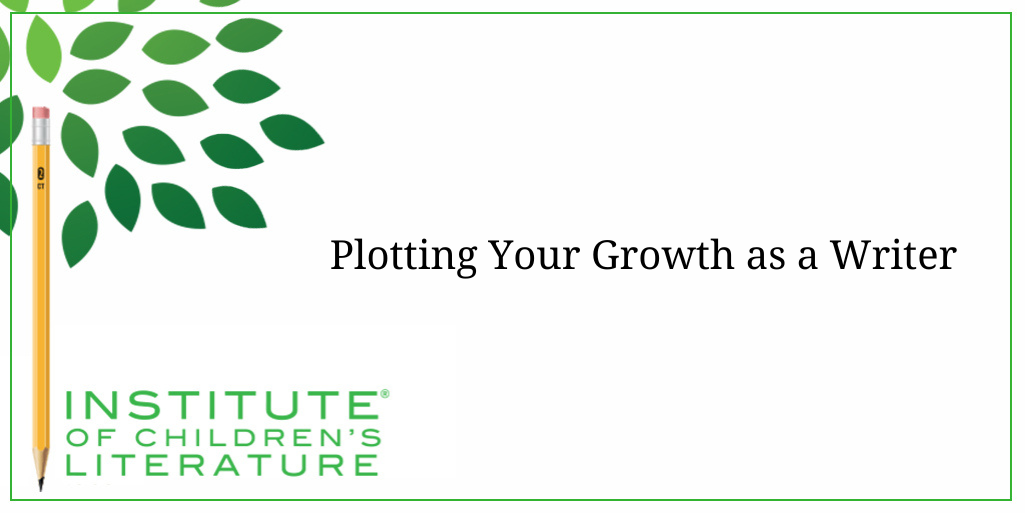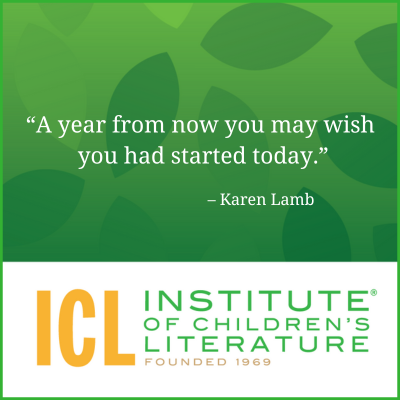
5 Ways Writers Can Prep for 2025 Goal Setting
Before we roll on to the new writing year, let’s harness our optimism for the blank slate before us and prepare for our 2025 Goal Setting just for writers.

Part of finding your place and even your motivation for writing comes from learning, so it’s smart to look for the most productive methods for plotting your growth as writer and improving your writing, which in turn can help you see where your skills best align with your goals. Now, I know listening to me tell you what you ought to do can get old, so I asked a bunch of friends what they did that most helped them grow as a writer and found the responses fell into some useful categories.
So let’s consider what helped other writers, so you can plot your growth as a writer too.
“Invested in learning about the craft from really reputable, experienced instructors.”
– Elizabeth Pagel-Hogan, author of Animal Allies, the Fantastic Failures series, and Discover Graphics: Mythical Creature series.
Writing is definitely a life-long learning experience and any plan for growth as a writer is sure to include learning. Not all learning experiences are created equal and not every option works for every writer. Since most of us are adults, we probably know whether we learn best from one-on-one instruction with an experienced instructor or if we are better motivated by things like online workshops or reading books on writing.

One of the best ways to judge the quality of instruction is to know whether you’re dealing with experienced instructors. I’ve seen amazing free online workshops from experienced writers who just want to give back to the community, so price isn’t always a reliable metric for whether you’re getting something good. I’ve also seen paid workshops from people with more enthusiasm than experience. So, take time to know the “experts” involved as you choose what learning to pursue.
Of course, ICL offers one-on-one writing courses with in-depth concentration on your writing style and the elements you specifically need to work on as a writer. Each of the instructors is a published author or experienced editor in children’s publishing and you can see their accolades and writing credits on the ICL instructors page.
“Working for Union Gospel Press taught me research skills, meeting deadlines, and following set rules. However, I would not have known how to apply for that job had I not taken the classes offered by the Institute of Children’s Literature. So I guess taking the courses from ICL was the most help in moving forward as a writer.”
– Tracey Eagan
As you choose what is going to work for you, three important criteria should be part of your decision:
Don’t invest a pile of money if you know you don’t have time to do the work. Sometimes you need to start with small steps (maybe writing books) and work up to something bigger and more expensive as you commit to writing.
Also, even the most experienced instructor might do some things differently from the way that will work best for you. Every writing journey to success is a little bit different, so evaluate constantly. Try things, but if it doesn’t work for you, don’t panic. That isn’t a sign that there is something wrong with you. It’s okay if your writing schedule, your style, and your choices are different from someone else. Part of learning is discovering what works best for you.
Much of the work of writing is done alone. That works great for introverts like me, but that doesn’t mean I don’t make connections. Joining writing groups, working with critique partners, and networking with other writers have all helped me to reach the point where I make a living from writing, and it will be important in any future success I have. So what are some good ways to connect?

– Kristin Wolden Nitz, author of Suspect, Saving the Griffin, and Defending Irene
One important option for connecting that came up several times in my discussions with other writers was SCBWI. The Society of Children’s Book Writers and Illustrators is a US-based but internationally-reaching organization for those who write for children. It is especially helpful for writers early in their careers because it offers writers helpful materials, excellent conferences, and critique group connections.
Critique groups are writing groups that get together electronically or personally to share writing and receive feedback. For those of us who work alone most of the time, the feedback of others can be hugely helpful so it’s not a surprise that it popped up more than once when I asked for what writers found the most helpful.
“Joined a critique group.”
– Lisa Lawmaster Hess, author of Courting Peace, Know Thyself: An Imperfectionist’s Guide to Sorting Your Stuff, and True Confession Wednesdays.
“Got involved in a critique group.”
– Sara Falstad Matson, author over 150 stories, articles, crafts, and activities for Highlights, Highlights High Five, Cricket, Boys’ Quest, and other magazines
Although SCBWI can be hugely helpful in making it easier for writers to connect with others to form critique groups, there are also groups forming on Facebook, and almost certainly through other social media. Joining writing groups through social media can offer networking possibilities outside of critique groups as well. But if you’re not really interested in social media and you really want to work with writers locally, I know of groups that have formed and lasted for years based on posts made at public libraries on their community bulletin boards. The key to a successful critique group is everyone committing to being active and to keeping what is shared in the group private.
“Stopped agonizing about publication and fully embraced the privilege of getting to do something I love every single day. Also, teaching creative writing. So much easier to see your mistakes when someone else is making them!”
– Sandy Asher, author Chicken Story Time, Too Many Frogs, and Just Like Jenny

Commitment to growth and improvement is the hardest part, but it can also be part of the joy. When we’re kind to ourselves and our growth, we can enjoy that growth rather than measuring it constantly against the harsh yardstick of publication. Also, as you grow and improve, sharing with those who are still growing is a huge opportunity. Sharing freely is one of the best things I ever did for my own writing.
“Aside from reading Jan’s amazing articles on writing from waaaaaaay back, I would say making time to write every day either a work-in-progress or a pitch. Things come to a stop when I fail to do either.”
– Pascale Duguay, freelance author of over 90 articles and books including SCBWI Bulletin, Highlights, Teen Breathe, and Spider among others.
“Set a schedule and made sure friends and family respected my work hours unless it was an emergency.”
– Lisa Rodinelli Albert, author of Mercy Lilly, Lois Lowry: Giver of Stories and Memories, and So You Want to be a Film or TV Actor?
Writing is work. Research is work. Practice, growth, and learning are work. And for success, work needs to be respected. Getting other people to respect the work you are doing begins with you respecting it yourself. To me, that respect goes hand in hand with a positive mindset. I love my career choice and it brings me amazing joy and incredible frustration, but my continued growth and success are so dependent on my taking the work seriously and treating it with respect.
Thankfully, it’s something my family now encourages every bit as much as I do, but that hasn’t always been the case. Just as I had to learn to treat my writing with respect, so did the people around me. But it didn’t start until it started with me.
“Not saying no to opportunities that were out of my comfort zone.”
– Anne E. Johnson, author of The Progress of Our People: A Story of Black Representation at the 1893 Chicago World’s Fair, the Webrid Chronicles, and Launching the Lunch Room

I was gratified to see how many writers responded with examples of things they did that were scary. And that can mean doing work that wasn’t exactly what you thought you’d be doing. I’ve written so many things that I never saw myself making money from, and I was scared. I worried that doing these other things meant giving up on my dreams, but I tried them anyway, and the results helped me so much. Check out the jobs these brilliant professionals did that helped them grow:
“Review books.”
– Paula Morrow, author of more than 70 books including nonfiction and fiction for all levels from preschool through college and former editor of children’s magazines
“[Got] a job as a journalist.”
– Shevi Arnold, author of Dan Quixote: Boy of Nuevo Jersey, Fay Fairy’s Very BIG Problem, and Why My Love Life Sucks
“[Did] work-for-hire books. These forced me to research, write, and edit on a tight schedule.”
– Rebecca Langston-George, author of For the Right to Learn: Malala Yousafzai’s Story, The Booth Brothers, and Fashion Forward: Creating Your Look with the Best of Vintage Style
“I worked as an editorial assistant at a magazine. It’s not so much that I learned writing skills, but rather that I learned to write a lot quickly and not to obsess over the ideas and words so much that I didn’t finish things.”
– Chris Eboch, author of over 100 books for children, including The Eyes of Pharaoh, The Well of Sacrifice, The Genie’s Gift,and the Haunted series
“I did a lit search for an Ed. publisher where I had to read 80 chapter books in a month. Then I said, “I can do this.” That one didn’t sell but the next one did.”
– Cindy Kane, former editor and author of Parrots Over Puerto Rico, Prairie Dog Song, Huzzah for Liberty, and Butterfly for a King
“For many years, I was reluctant to take on work-for-hire. I wanted to write my own things in my own way, and I was really against pumping out books quickly. By taking on work-for-hire, it blew the door open. One day, I happened to find a blog post that pretty much had my name on it. The publisher was looking for children’s writers with a background in technology. I answered the open call. I wrote 2 books in a series. They asked me to write 4 more, then 2 more. I also answered a second open call and wrote a traditionally published book for the same publisher (different imprint). So, being flexible and open to opportunities opened doors.”
– Linda Rose Zajac, author of Robo-motion, Minecraft Crafts, and Minecraft Mobs

“Learning to filter all of the advice I had heard and read and trust my own process.”
– Pam Holtz Beres, author of dozens of articles in Pockets, Guide, My Friend, Children’s Digest, Jack and Jill, On the Line, Partners, Junior Trails, and Wee Wisdom
Some things are universally part of a successful writing journey: hard work, not giving up, frustration, hope, and learning.
But the way those things come together for each of us is unique. It’s like watching any huge group of artists creating from the same basic materials. Some artists will work in similar ways and some people will do wild, unexpected things that might succeed and might not. But as each person finds their style and does the work, the results are amazing. Your growth as a writer will be that way too. Just keep at it.
With over 100 books in publication, Jan Fields writes both chapter books for children and mystery novels for adults. She’s also known for a variety of experiences teaching writing, from one session SCBWI events to lengthier Highlights Foundation workshops to these blog posts for the Institute of Children’s Literature. As a former ICL instructor, Jan enjoys equipping writers for success in whatever way she can.

Before we roll on to the new writing year, let’s harness our optimism for the blank slate before us and prepare for our 2025 Goal Setting just for writers.

Writers can be thin-skinned when it comes to getting feedback on their work. Let’s look at 4 ways to positively deal with constructive criticism!

Rejection is part of the territory when it comes to being a writer. Today we offer reflection for writers to help redirect your efforts after a rejection.
1000 N. West Street #1200, Wilmington, DE 19801
© 2024 Direct Learning Systems, Inc. All rights reserved.
1000 N. West Street #1200, Wilmington, DE 19801
© 2024 Direct Learning Systems, Inc. All rights reserved.
1000 N. West Street #1200, Wilmington, DE 19801
© 2024 Direct Learning Systems, Inc. All rights reserved.
1000 N. West Street #1200, Wilmington, DE 19801
© 2025 Direct Learning Systems, Inc. All rights reserved.
1000 N. West Street #1200, Wilmington, DE 19801
©2025 Direct Learning Systems, Inc. All rights reserved. Privacy Policy.
10 Comments